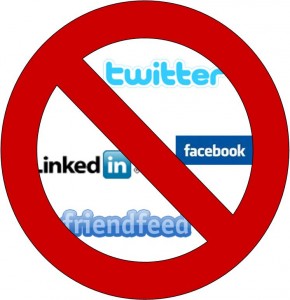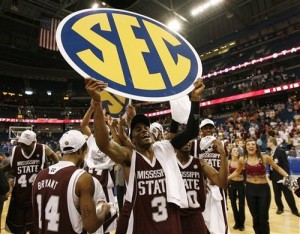 Southeastern Conference associate commissioner for media relations, Charles Bloom, has had better weeks. Actually, so has everyone in the SEC offices in Birmingham, Ala.
Southeastern Conference associate commissioner for media relations, Charles Bloom, has had better weeks. Actually, so has everyone in the SEC offices in Birmingham, Ala.
Just days after a conference ticket policy went into place, the SEC began to receive unprecedented criticism from season ticket holders at its 12 member schools to media nationwide. The primary complaint stemmed from language that when taken at face value, said that fans could not share their game experiences via social media – Twitter, Facebook and other outlets on which people like to post photos and comments during games. The league, which had signed an exclusive, lucrative, broadcast contract with ESPN and CBS in August 2008, that would take effect with the 2009-2010 sports season, was accused of prioritizing corporate dollars en route to disrespecting its fans.
“”We never intended to cut off social media in our stadiums,” Bloom said. “It was the language that was misleading.”
According to Bloom, who has deep roots within the SEC, having held sports information positions at member schools and at the Conference office since the late 1980s, the original ticket policy focused on the protection of video and photo rights.
“Our objective was to not flood the market with unlicensed video,” Bloom said. “Since this was a first-of-its-kind document for us, we relied heavily on information from other like documents, and those were very restrictive.”
“This a classic battle of PR versus legal and financial decisions. I think where we landed was a good middle ground for everyone.”
Upon further review, the SEC released a revised ticket policy. Unfortunately, by the time they put red pen to legal papers, the league had been dealt a big public relations blow with blog posts including Mashable, and stories in the New York Times and on CNN.com Live, shared among thousands.
Even after the SEC announced that a revision would be released, Bloom and his colleagues did their best to stop the PR bloodletting.
“As a PR professional, one of my main objectives is to obtain as much positive coverage on the league as possible,” Bloom said. “That is done various ways and sometimes you have to balance that by making unpopular decisions that in the end, benefits the league. Even after all is said and done, we will continue to accept comments and feedback.”
Bloom said that although each school had to sign off on the initial policy prior to making it public, the blaze of criticism took those not in the know about the impact of social media, by surprise. They didn’t realize that by telling fans they could not share photos and experiences via these widely viewed online portals, they would make fans believe they were less than valuable to the league.
That’s not to say that Bloom, who is @SECSportsUpdate on Twitter and has a Fan Page on Facebook didn’t learn something in the face of the publicity crisis.
“I was surprised with how quick and viral the issue became on social media,” Bloom said. “It was an amazing exercise for me and showed how important social media will become in our communications strategy.”
 The SEC is using old-fashioned media relations to help ease the wounds of its mistakes as it continues to answer questions about its ticket and media policies.
The SEC is using old-fashioned media relations to help ease the wounds of its mistakes as it continues to answer questions about its ticket and media policies.
“Through all of this, we have done our best to return every phone call and email possible on the subject. That’s been our tactic because we have heard from so many,” Bloom said. “We did not issue a press release on the revision – we put it on Twitter and used our PR contacts to help spread the word.
“Social media will grow in the future. It may be in our best interest to have someone on our staff who is exclusively devoted to it – hopefully that will come one day.”
###
Gail Sideman assisted the SEC to communicate the value of its fans to the league and in the communication of its revised policy.
Photo Credits: Social Media ; SEC


The problem with the SEC response is that the excuse that they basically admit to cut and pasting this restrictive and unpopular policy does not win the league any respect.
And they used a version of the old, “other people are doing it.”
If your kid said that, it wouldn’t wash.
Now if they had said they carefully crafted this and people were making the wrong assumptions so they would change it, great.
They give the impression that the fans are not high on their list if priorities. That was the big mistake.
Seems like attempts to reign in and control what happens on the net generally have a way of backfiring…
Gail- for the SEC (and any organization) I think the moral of the story is if you’re going to be doing anything with social media (including policies), make sure to involve people who actually are involved with social media to get their feedback and make sure it’s done the right way.
Thank you for sharing this great post, I am very impressed with your post, the information given is detailed and easy to understand. I will follow your next post often.